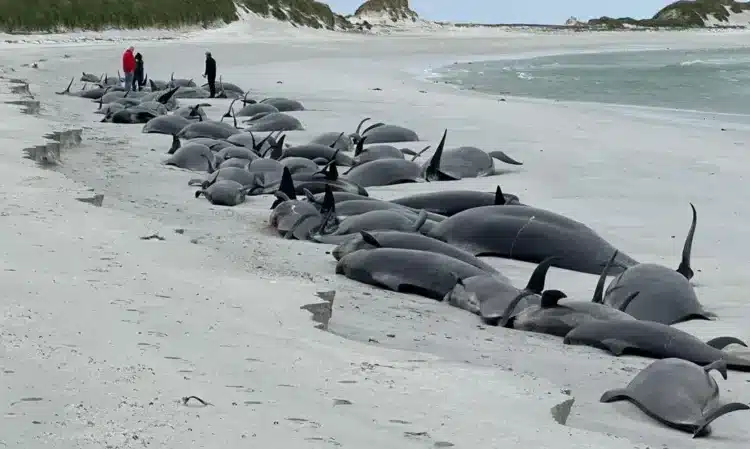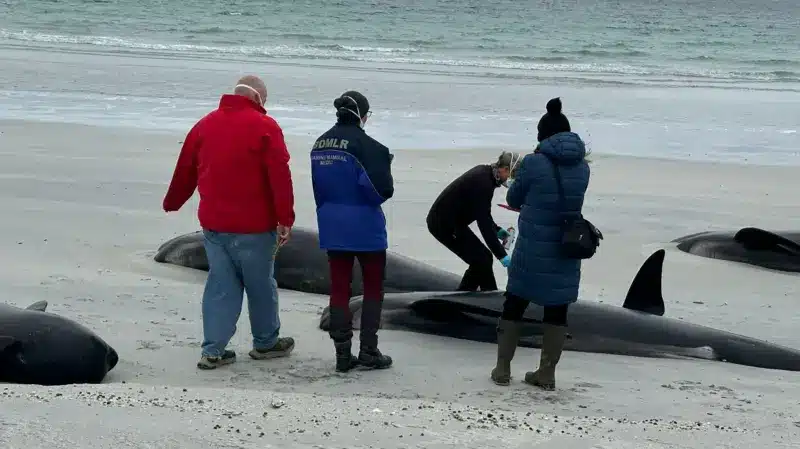77 Whales Die in Biggest Mass Stranding in Decades

A pod of 77 pilot whales has died after washing ashore on a beach in Orkney in what could be the biggest mass stranding for decades.
The British Divers Marine Life Rescue (BDMLR) had found that 12 of the animals at Tresness Beach on the island of Sanday were still alive when they were discovered. However, after efforts to refloat them failed, the decision was made to euthanize them.
The pod included male whales up to seven meters (22ft) long, as well as females, calves, and juveniles. Experts say it is too early to determine what caused the stranding, but it is likely that one of the whales got into trouble and the rest of the pod tried to help.
Public Advised to Stay Away
Members of the public are being asked to stay away from the area while post-mortem examinations are carried out. This event is thought to be the largest stranding in Scotland since at least 1995, when the Scottish Marine Animal Stranding Scheme (SMASS) was founded, although similar events have been recorded in recent years.
Previous Stranding Incidents
Last year, an entire pod of 55 pilot whales died following a stranding on Lewis. In that incident, only 15 of the whales were alive when they washed ashore. One was successfully refloated while the rest had to be euthanized. In 2011, between 60-70 pilot whales came into shallow waters in Sutherland.
According to the Natural History Museum, the largest UK stranding occurred in 1927 when 126 out of more than 130 false killer whales died in the Dornoch Firth in the Highlands.
Rescue Efforts
Experts from the BDMLR, the Scottish SPCA, and marine vets from the Scottish mainland traveled to Sanday to assess whether any of the whales could be saved. The area was cut off by the high tide, and the sand on the beach where they were stranded was too soft to allow the mammals to be righted. The whales needed to be moved back into an upright position as quickly as possible to have any chance of survival. However, the soft sand caused the whales to fall back over when rescuers attempted to right them.
Emma Neave-Webb from the BDMLR noted early on that while these experiences are difficult, the thinking had to be “realistic.”
Emotional Scene
BDMLR medics were brought in from mainland Orkney and Inverness to help with the rescue attempt, but Ms. Neave-Webb said it appeared the whales had been stranded for “quite some time.” She described the scene as “really quite horrible” and “hugely emotional.” Rescuers attempted to keep the whales alive by pouring seawater over them, but the decision was later made to euthanize them.
Disposal of Bodies
A spokesperson for Orkney Islands Council said discussions were taking place with community representatives on how best to dispose of the bodies. They said: “In previous circumstances where whales have beached on our shores and subsequently died, the approach from our Environmental Health team around disposing of the body has been to allow nature to take its course – with the public advised to stay away from the area.
“Our assessment in this case, given the scale and the likely public health implications, is that more definite action will need to be taken, for example, burying them where they are or removing the bodies to a large grave site elsewhere.”
Increasing Frequency of Mass Strandings
Andrew Brownlow of the Scottish Marine Animal Stranding Scheme said mass strandings of this scale are becoming more common in Scotland. He told BBC News: “It used to be quite unusual to have a mass stranding event, certainly of this size. But over the last ten years or so, we have seen an increase both in the number of mass stranding events around Scotland and also the size of the mass and the number of animals that it involves. So that is slightly concerning and that might be because there are just more animals out there, or it could be that there are more hazards that these animals are exposed to.”
This tragic event highlights the ongoing mystery and increasing frequency of mass strandings, raising concerns among marine experts and conservationists.


